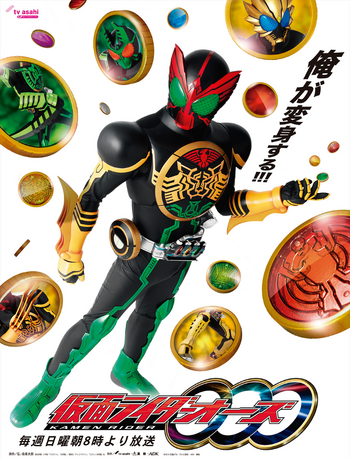 Kamen Rider OOO [2010-2011]
Kamen Rider OOO [2010-2011]
"Ta To Ba TA TO BA Tatoba!"
So OOO (pronounced O's, like Oz) is perhaps one of the more recent Rider shows I've watched, probably one of the final "Heisei Phase II" shows I've watched. Mostly because... well, while the cast seemed pleasant, there just wasn't a whole ton that drew me into the show, y'know? At least, initially. Being spoiled about the ending of OOO in a Build movie or something also helped in me going "well, what the fuck's the point in me watching anymore?"
And... and, well, I'm kind of glad I did manage to finally bite the bullet and watch the series.
 So OOO was definitely very... very much like your generic Heisei-era Kamen Rider show in its early days, and as the second show in Heisei Phase II, there definitely seemed to be a bit of the writers and showrunners figuring out the pacing and tone of the show as they go -- it's pretty obvious that they're trying to ape the formula of the highly popular and successful Double before it, but with a little twist -- the two "partners", so to speak, aren't so much two good guys working together and combining into a superhero like Double, but rather just an airheaded "I'll help everyone in the world" handsome hobo, and a floating hand that parasitizes some poor schmuck policeman who is just flat out a villain in his first couple dozen episodes, making it clear that he's only staying with our good guys out of a lack of choice.
So OOO was definitely very... very much like your generic Heisei-era Kamen Rider show in its early days, and as the second show in Heisei Phase II, there definitely seemed to be a bit of the writers and showrunners figuring out the pacing and tone of the show as they go -- it's pretty obvious that they're trying to ape the formula of the highly popular and successful Double before it, but with a little twist -- the two "partners", so to speak, aren't so much two good guys working together and combining into a superhero like Double, but rather just an airheaded "I'll help everyone in the world" handsome hobo, and a floating hand that parasitizes some poor schmuck policeman who is just flat out a villain in his first couple dozen episodes, making it clear that he's only staying with our good guys out of a lack of choice.
And this sort of partnership could have been really been annoying with less impressive actors, but I really do appreciate just how much they handled the "defrosting ice-cold villain" trope well in this show. Everyone who watches the show often agrees that Ankh and his dynamic with our heroes is probably the best part of the show.
But while undoubtedly one of the more light-hearted series in Kamen Rider -- even with the constant black comedy of Ankh killing and/or completely taking over the body of officer Shingo, the pacing and the writing of the story is perhaps its greatest strength. The story constantly revolves around themes of greed and desire, but in a way that feels organic and not shoehorned in like some other shows with their own distinct themes (sorry, Wizard and Ghost). Every character of the day and major character have their own desires, and we get some decent speeches on what part of a person's life is most important -- births and beginnings or the end and the final introspective look at what a person's life amounted to. It's some surprisingly deep themes for a kid's show.
 The protagonist, Hino Eiji, initially seems to be the perfect counter and the most frustrating partner that the greedy and desire-laden Ankh could've been partnered up with. He's an airheaded, bumbling hobo moron that notes that he doesn't have any more desire beyond helping out people and having underwear for the next day (that underwear joke, despite showing up in every single one of Eiji's appearances in the future, only lasted about two episode). It seems like the show was going to get into some heavy-handed talk about how desire is always evil, but then the show actually ends up subverting my expectations that it won't be handled well and ends up deconstructing Eiji's lack of desire as something that's as unhealthy as excessive desire.
The protagonist, Hino Eiji, initially seems to be the perfect counter and the most frustrating partner that the greedy and desire-laden Ankh could've been partnered up with. He's an airheaded, bumbling hobo moron that notes that he doesn't have any more desire beyond helping out people and having underwear for the next day (that underwear joke, despite showing up in every single one of Eiji's appearances in the future, only lasted about two episode). It seems like the show was going to get into some heavy-handed talk about how desire is always evil, but then the show actually ends up subverting my expectations that it won't be handled well and ends up deconstructing Eiji's lack of desire as something that's as unhealthy as excessive desire.
OOO's secondary cast is, interestingly enough... probably the most rounded-out of most of the Heisei show. These Heisei shows tend to like to introduce new characters and new faces halfway through the season, and in some shows in particular like Ex-Aid or Wizard or Den-O, it is really hard to care for final villains that didn't quite has enough development or screentime. OOO actually introduces a massive cast straight off the bat in its first two episodes, and the only ones to show up in the middle of the series -- and at a relatively early point, too -- is probably Date and Dr. Maki, both of whom are relatively well-integrated as well.
The pacing is pretty much well-done as far as characterization goes (if not for the plotting, and what the bad guys are doing is pretty much obvious from the get-go). We don't get huge episodes where the character just does a full 180 on their characterization thanks to traumatic events that happened in a single episode, but the character development on people like Ankh and Date are gradually realized over the course of the season's run, making these people genuinely feel like, well, real people.
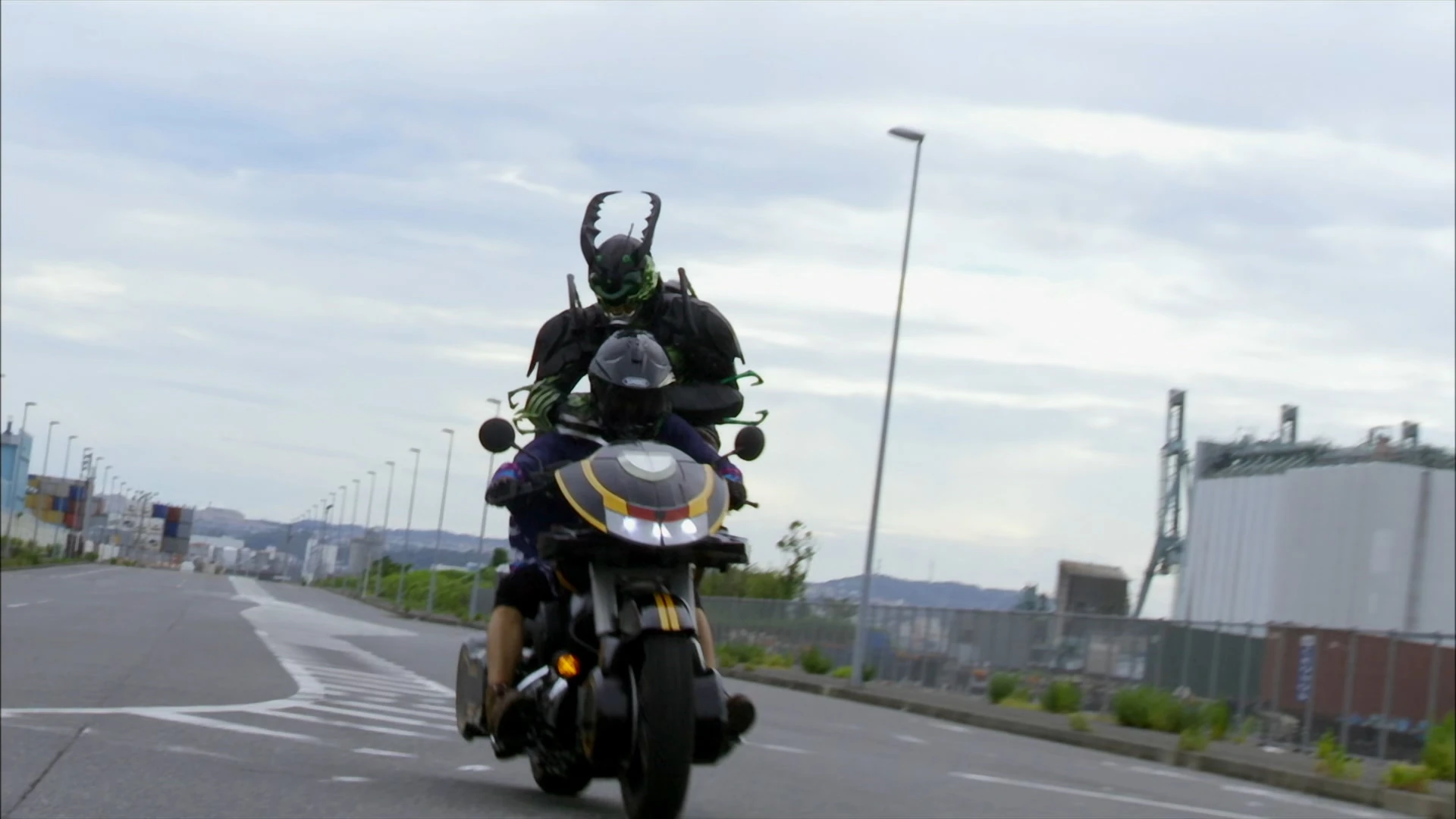 OOO also manages something that a lot of Kamen Rider shows struggle with, and that's to make a villain ensemble seem threatening while at the same time making it feasible for them to be taken out every single episode. They're not spectacular, complex and well-layered villains, but I'll remember them a lot more readily than some other villains. The fact that all of the main Greeed, like Ankh, are depowered and they have to hunt down all of their Core Medals to grow and achieve their original, full form, means that the insane speed at how medals are obtained and stolen away ends up shifting the power balance of Kamen Rider OOO significantly. I've seen a lot of these "collect all of the toys" shows, but none that has a handle on distributing power-ups as well as OOO.
OOO also manages something that a lot of Kamen Rider shows struggle with, and that's to make a villain ensemble seem threatening while at the same time making it feasible for them to be taken out every single episode. They're not spectacular, complex and well-layered villains, but I'll remember them a lot more readily than some other villains. The fact that all of the main Greeed, like Ankh, are depowered and they have to hunt down all of their Core Medals to grow and achieve their original, full form, means that the insane speed at how medals are obtained and stolen away ends up shifting the power balance of Kamen Rider OOO significantly. I've seen a lot of these "collect all of the toys" shows, but none that has a handle on distributing power-ups as well as OOO.
There are some parts of OOO that isn't perfect, of course. The first half is pretty slow and very episodic, not helped by an anniversary two-parter that feels genuinely shoehorned and trying to be meta for the sake of being meta. The final villain of the show, while certainly a character that's built up, also feels somewhat disappointing in execution. And there definitely are some secondary characters I wished they did more with.
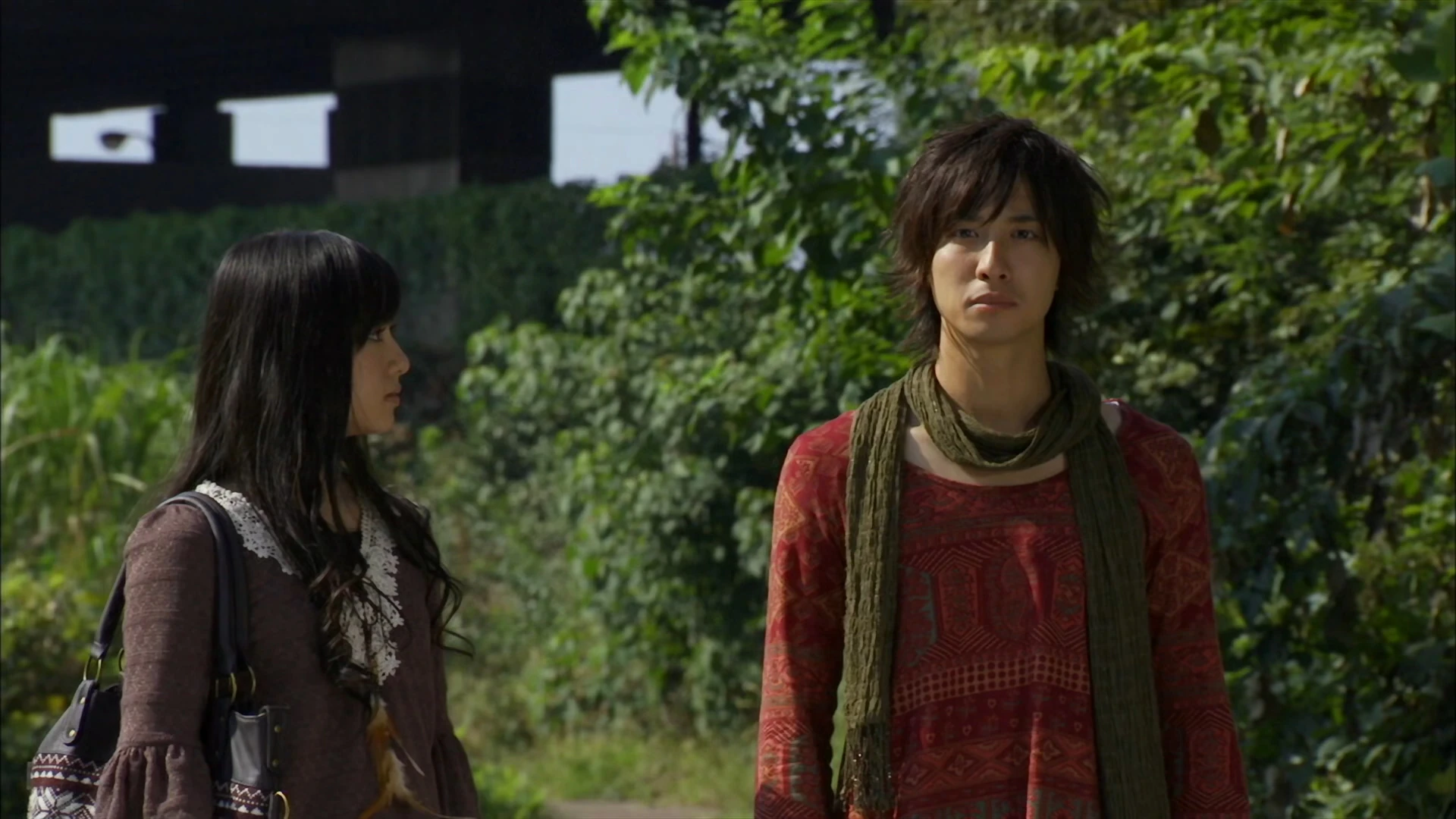 But ultimately, while OOO as a show doesn't do a whole ton, it's just pretty pleasant to watch thanks to the two leading men being pretty damn great at their jobs. I've always felt like OOO is probably one of the 'safest' shows -- it has a unique story to itself and a unique vibe, the quality is consistent throughout the entire series, and the characters are well-written. It's just that the ending is a smidge bit anti-climactic from a fighty-fight standpoint (although certainly very emotional), some characters are under-utilized... it's definitely not bad, and definitely an above-average show, but while it doesn't WOW me by doing something unexpected, it's just such a solid meal, so to speak, all throughout. It's got some problems, but while it perhaps feels a bit generic, it's definitely an entertaining show all around and one I'll recommend.
But ultimately, while OOO as a show doesn't do a whole ton, it's just pretty pleasant to watch thanks to the two leading men being pretty damn great at their jobs. I've always felt like OOO is probably one of the 'safest' shows -- it has a unique story to itself and a unique vibe, the quality is consistent throughout the entire series, and the characters are well-written. It's just that the ending is a smidge bit anti-climactic from a fighty-fight standpoint (although certainly very emotional), some characters are under-utilized... it's definitely not bad, and definitely an above-average show, but while it doesn't WOW me by doing something unexpected, it's just such a solid meal, so to speak, all throughout. It's got some problems, but while it perhaps feels a bit generic, it's definitely an entertaining show all around and one I'll recommend.
So OOO (pronounced O's, like Oz) is perhaps one of the more recent Rider shows I've watched, probably one of the final "Heisei Phase II" shows I've watched. Mostly because... well, while the cast seemed pleasant, there just wasn't a whole ton that drew me into the show, y'know? At least, initially. Being spoiled about the ending of OOO in a Build movie or something also helped in me going "well, what the fuck's the point in me watching anymore?"
And... and, well, I'm kind of glad I did manage to finally bite the bullet and watch the series.
Overall, Mostly Spoiler-Free Series Review:
 So OOO was definitely very... very much like your generic Heisei-era Kamen Rider show in its early days, and as the second show in Heisei Phase II, there definitely seemed to be a bit of the writers and showrunners figuring out the pacing and tone of the show as they go -- it's pretty obvious that they're trying to ape the formula of the highly popular and successful Double before it, but with a little twist -- the two "partners", so to speak, aren't so much two good guys working together and combining into a superhero like Double, but rather just an airheaded "I'll help everyone in the world" handsome hobo, and a floating hand that parasitizes some poor schmuck policeman who is just flat out a villain in his first couple dozen episodes, making it clear that he's only staying with our good guys out of a lack of choice.
So OOO was definitely very... very much like your generic Heisei-era Kamen Rider show in its early days, and as the second show in Heisei Phase II, there definitely seemed to be a bit of the writers and showrunners figuring out the pacing and tone of the show as they go -- it's pretty obvious that they're trying to ape the formula of the highly popular and successful Double before it, but with a little twist -- the two "partners", so to speak, aren't so much two good guys working together and combining into a superhero like Double, but rather just an airheaded "I'll help everyone in the world" handsome hobo, and a floating hand that parasitizes some poor schmuck policeman who is just flat out a villain in his first couple dozen episodes, making it clear that he's only staying with our good guys out of a lack of choice.And this sort of partnership could have been really been annoying with less impressive actors, but I really do appreciate just how much they handled the "defrosting ice-cold villain" trope well in this show. Everyone who watches the show often agrees that Ankh and his dynamic with our heroes is probably the best part of the show.
But while undoubtedly one of the more light-hearted series in Kamen Rider -- even with the constant black comedy of Ankh killing and/or completely taking over the body of officer Shingo, the pacing and the writing of the story is perhaps its greatest strength. The story constantly revolves around themes of greed and desire, but in a way that feels organic and not shoehorned in like some other shows with their own distinct themes (sorry, Wizard and Ghost). Every character of the day and major character have their own desires, and we get some decent speeches on what part of a person's life is most important -- births and beginnings or the end and the final introspective look at what a person's life amounted to. It's some surprisingly deep themes for a kid's show.
 The protagonist, Hino Eiji, initially seems to be the perfect counter and the most frustrating partner that the greedy and desire-laden Ankh could've been partnered up with. He's an airheaded, bumbling hobo moron that notes that he doesn't have any more desire beyond helping out people and having underwear for the next day (that underwear joke, despite showing up in every single one of Eiji's appearances in the future, only lasted about two episode). It seems like the show was going to get into some heavy-handed talk about how desire is always evil, but then the show actually ends up subverting my expectations that it won't be handled well and ends up deconstructing Eiji's lack of desire as something that's as unhealthy as excessive desire.
The protagonist, Hino Eiji, initially seems to be the perfect counter and the most frustrating partner that the greedy and desire-laden Ankh could've been partnered up with. He's an airheaded, bumbling hobo moron that notes that he doesn't have any more desire beyond helping out people and having underwear for the next day (that underwear joke, despite showing up in every single one of Eiji's appearances in the future, only lasted about two episode). It seems like the show was going to get into some heavy-handed talk about how desire is always evil, but then the show actually ends up subverting my expectations that it won't be handled well and ends up deconstructing Eiji's lack of desire as something that's as unhealthy as excessive desire.OOO's secondary cast is, interestingly enough... probably the most rounded-out of most of the Heisei show. These Heisei shows tend to like to introduce new characters and new faces halfway through the season, and in some shows in particular like Ex-Aid or Wizard or Den-O, it is really hard to care for final villains that didn't quite has enough development or screentime. OOO actually introduces a massive cast straight off the bat in its first two episodes, and the only ones to show up in the middle of the series -- and at a relatively early point, too -- is probably Date and Dr. Maki, both of whom are relatively well-integrated as well.
The pacing is pretty much well-done as far as characterization goes (if not for the plotting, and what the bad guys are doing is pretty much obvious from the get-go). We don't get huge episodes where the character just does a full 180 on their characterization thanks to traumatic events that happened in a single episode, but the character development on people like Ankh and Date are gradually realized over the course of the season's run, making these people genuinely feel like, well, real people.
 OOO also manages something that a lot of Kamen Rider shows struggle with, and that's to make a villain ensemble seem threatening while at the same time making it feasible for them to be taken out every single episode. They're not spectacular, complex and well-layered villains, but I'll remember them a lot more readily than some other villains. The fact that all of the main Greeed, like Ankh, are depowered and they have to hunt down all of their Core Medals to grow and achieve their original, full form, means that the insane speed at how medals are obtained and stolen away ends up shifting the power balance of Kamen Rider OOO significantly. I've seen a lot of these "collect all of the toys" shows, but none that has a handle on distributing power-ups as well as OOO.
OOO also manages something that a lot of Kamen Rider shows struggle with, and that's to make a villain ensemble seem threatening while at the same time making it feasible for them to be taken out every single episode. They're not spectacular, complex and well-layered villains, but I'll remember them a lot more readily than some other villains. The fact that all of the main Greeed, like Ankh, are depowered and they have to hunt down all of their Core Medals to grow and achieve their original, full form, means that the insane speed at how medals are obtained and stolen away ends up shifting the power balance of Kamen Rider OOO significantly. I've seen a lot of these "collect all of the toys" shows, but none that has a handle on distributing power-ups as well as OOO.There are some parts of OOO that isn't perfect, of course. The first half is pretty slow and very episodic, not helped by an anniversary two-parter that feels genuinely shoehorned and trying to be meta for the sake of being meta. The final villain of the show, while certainly a character that's built up, also feels somewhat disappointing in execution. And there definitely are some secondary characters I wished they did more with.
 But ultimately, while OOO as a show doesn't do a whole ton, it's just pretty pleasant to watch thanks to the two leading men being pretty damn great at their jobs. I've always felt like OOO is probably one of the 'safest' shows -- it has a unique story to itself and a unique vibe, the quality is consistent throughout the entire series, and the characters are well-written. It's just that the ending is a smidge bit anti-climactic from a fighty-fight standpoint (although certainly very emotional), some characters are under-utilized... it's definitely not bad, and definitely an above-average show, but while it doesn't WOW me by doing something unexpected, it's just such a solid meal, so to speak, all throughout. It's got some problems, but while it perhaps feels a bit generic, it's definitely an entertaining show all around and one I'll recommend.
But ultimately, while OOO as a show doesn't do a whole ton, it's just pretty pleasant to watch thanks to the two leading men being pretty damn great at their jobs. I've always felt like OOO is probably one of the 'safest' shows -- it has a unique story to itself and a unique vibe, the quality is consistent throughout the entire series, and the characters are well-written. It's just that the ending is a smidge bit anti-climactic from a fighty-fight standpoint (although certainly very emotional), some characters are under-utilized... it's definitely not bad, and definitely an above-average show, but while it doesn't WOW me by doing something unexpected, it's just such a solid meal, so to speak, all throughout. It's got some problems, but while it perhaps feels a bit generic, it's definitely an entertaining show all around and one I'll recommend. Characters [Spoilers Ahoy]


 Hino Eiji is Kamen Rider OOO, and he's... he's an interesting bloke! A lot of the huge revelations about his character has essentially been spoiled to me thanks to other tie-in material, though I do appreciate how we build up towards them. He's initially introduced as a pretty simple person, an airhead who just wants to help everyone, and while naive and seeing the best in most people, Eiji knows enough that he needs to keep OOO's powers for himself to protect people in general, even if it means allying with what's quite literally the lesser of two devils in Ankh.
Hino Eiji is Kamen Rider OOO, and he's... he's an interesting bloke! A lot of the huge revelations about his character has essentially been spoiled to me thanks to other tie-in material, though I do appreciate how we build up towards them. He's initially introduced as a pretty simple person, an airhead who just wants to help everyone, and while naive and seeing the best in most people, Eiji knows enough that he needs to keep OOO's powers for himself to protect people in general, even if it means allying with what's quite literally the lesser of two devils in Ankh.And throughout a lot of the early days of the show, Eiji's honestly a pretty flat character, just being essentially a babysitter for Ankh, telling the floating arm that, no, god damn it, killing people and utilizing them as your own coin farms is not right. The show manages to make their banter and their ethical arguments feel organic while not compromising from Ankh's stance at being a greedy greedy floating arm monster.
 We later learn that he's the son of a rich politician or something who ended up in a traumatic incident where he was dragged into a civil war in Africa and a little girl he befriended is killed -- and the resulting political aftermath and how Eiji was rescued because of his family's connections ended up being why he became a wanderer with no desires, shutting out and repressing any desire and devotes himself to help random strangers.
We later learn that he's the son of a rich politician or something who ended up in a traumatic incident where he was dragged into a civil war in Africa and a little girl he befriended is killed -- and the resulting political aftermath and how Eiji was rescued because of his family's connections ended up being why he became a wanderer with no desires, shutting out and repressing any desire and devotes himself to help random strangers.In the final arc, Eiji ends up apparently being the ideal vessel for the Hulk-esque PuToTyranno combo, a sixth set of medals that have no corresponding Greeed, thanks to his lack of desire... before finally allowing himself to confront the fact that, yes, he has a desire -- one to help people. It's nowhere as complex as Ankh's characterization, but 48-episode show has definitely managed to build Eiji up from an airheaded hobo into a genuinely interesting character.
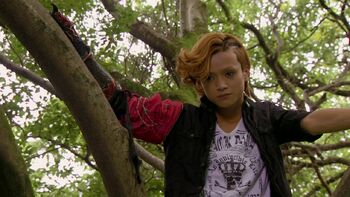
 You could argue that Ankh is actually the main protagonist of the show, and Eiji's more of the supporting character that helps him grow, and honestly... that's how I felt about him. Ankh always felt like the more interesting character of the two, initially being straight-up not caring for anyone in the world other than himself, only keeping Eiji and Hina around out of convenience and because fighting Eiji is probably losing the only people who would cooperate with him and find medals for him.
You could argue that Ankh is actually the main protagonist of the show, and Eiji's more of the supporting character that helps him grow, and honestly... that's how I felt about him. Ankh always felt like the more interesting character of the two, initially being straight-up not caring for anyone in the world other than himself, only keeping Eiji and Hina around out of convenience and because fighting Eiji is probably losing the only people who would cooperate with him and find medals for him.And I really, really do love how well-done the defrosting process takes place, how Ankh slowly gets development and begins to care for his friends -- albeit initially in a more "these are mine, they belong to me, stay away from them" tsundere mindset. Of course, things get complicated when Eiji almost always tends to pick saving random civilians over gathering medals, which led to some fights and arguments between the two. Also, there's always the glaring ethical confusion and debate of just how things are going to happen since Ankh's an arm that parasitized the dying body of a police officer, Izumi Shingo... and while it's initially just played for laughs and handwaved (because you gotta get that specific actor to play Ankh) I do appreciate that the show would later spend a couple of episodes to properly discuss the ethics of Ankh's body-stealing, even if I do think the ending is a cop-out.
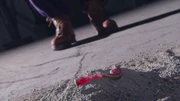 Honestly, portraying Ankh as a genuine Starscream-type character, a schemer that will backstab and betray everyone in his path and only hangs out with Eiji because he's way too dumb to have an alternative plan, is genuinely great. The fact that they gave Ankh this "greedy but fair" mentality of always paying his debts is also something that makes him an embodiment of desire that you can believe is not in 24/7 "gimme gimme more" mode.
Honestly, portraying Ankh as a genuine Starscream-type character, a schemer that will backstab and betray everyone in his path and only hangs out with Eiji because he's way too dumb to have an alternative plan, is genuinely great. The fact that they gave Ankh this "greedy but fair" mentality of always paying his debts is also something that makes him an embodiment of desire that you can believe is not in 24/7 "gimme gimme more" mode.And when he finally grows into his full Greeed form and teams up with the other Greeed, actor Miura Ryosuke really manages to sell just how conflicted Ankh has been. He's broken out from the humans, right? His desire is for full resurrection, right? Why did he feel so distant from the far more one-dimensional Greeed fellows? It's genuinely great stuff that builds up upon a whole season's worth of development, culminating in an amazing punch-out battle between him and Eiji on that beach, as well as his ultimate heroic sacrifice.
It's just such a shame that his death has sort of been handwaved aside by so many future projects, having him return from the dead only to die again -- he probably died about as many times as Tenkuji Takeru at this point. Still... a small complaint, and within the constraints of his own show, Ankh is easily hands-down my favourite character.

Supposedly rounding up the main character trio with Eiji and Ankh is Izumi Hina, little sister of the police officer that Ankh takes over, but... she never really develops a whole ton or has much of a personality other than being a pleasant person? She gets to do a fair bit near the end, mostly angsting at the potential of choosing between her brother and Ankh, who she has grown to view as a friend, but while it's not exactly breezed over, I really felt like Hina was utterly under-utilized.
Also, she has super-strength, which I thought was going to be relevant and be some huge revelation down the line, but it's basically never really brought up other than when it's relevant for gags. And for a lady with super-strength, the writers still disappointingly use Hina as a damsel in distress a lot.


Goto Shintaro, a.k.a. the second Kamen Rider Birth, is... he's definitely an interesting character. The writing is a bit more shaky with Goto, but he shows up from the beginning as a pretty competent underling of Kougami, shown as basically being similar to every secret agent type out there, and he definitely has more than his fair share of saviour complex... only to be humiliated multiple times, being shown that Eiji, Date and even Ankh are more competent than him in this whole world-saving business.
And I really do love the soul-searching that Goto takes over the series. First ending up as a part-timer in Chiyoko's restaurant, then swallowing his pride and begging for Date to teach him how to utilize the weapons and Birth suit, something that's apparently pretty taxing on the body as a man-made Rider suit, and eventually accept his lot in life as not the saviour, but part of a team with his allies and friends. Goto's a character that I felt I couldn't stand when I first saw him, but eventually ended up feeling pretty "real". Kougami and Date both play amazing mentor roles for Goto as well, directing his desires and pride in a relatively healthy direction.


The main wielder of the "Birth" driver for the majority of the show is Date Akira, the "fighting doctor" and a former combat medic who's... who's well-meaning, but ultimately airheaded and kinda dumb. Introduced as Kougami's alternate employee and acting in a very good-natured opposition as he sucks in all of the cell medals from defeated Greeed minions, Date seems to be a greedy mercenary... but such a pleasant one. It's an interesting subversion of what could've been a generic bounty hunter type character, and, of course, it turns out that between the bullet in his head and the desire to build a self-sufficient medical school in a third-world country, everything he's been doing (including betraying the heroes at one point!) is thanks to wanting to do something right.
Date's perhaps not the most complex character in the show, but he's all right.

HAPPY BIRTHDAY! Kougami is played by an actor who's not afraid to ham shit up, and acts like this super-rich sponsor that supplies OOO with all of his fancy toys while also subtly manipulating events to lead to certain events he desires. And... and I'm genuinely baffled. Where Ankh and Eiji and Goto's development are all well-written, Kougami feels like... he feels like an NPC, you know? He has a single mood, and that mood is shouting HAPPY BIRTHDAY and SPLENDID whenever people show off a development, like when one of his employees grows a backbone or a new being is "born".
Kougami is obsessed with new births, and... and I'm genuinely afraid to say that while he has certainly been entertaining, the story of Kougami foundation and just what the fuck is up with him is easily one of the weakest links in OOO as a show. It's definitely a bit unfortunate. He definitely plays the not-quite-so-benign ally pretty well, though.

Satonaka Erika is... she's sort of there? Kougami's secretary-turned-Black-Widow-esque character, Satonaka is genuinely just there, prominent enough to be memorable, but all she does is just be weird and do stereotypical lady stuff, and it's very unfortunate that despite being a badass backup for when Goto ends up becoming Birth, so much focus is put on her one-note gag of taking so long to put on makeup that she delays Birth's deployment.


Also just there is Chiyoko, who is the den mother of Cous Coussier, the hilarious "cuisine from all around the world" restaurant that eventually takes in Eiji and Ankh as tenants. She is as under-developed as most of these den mother/den father type characters in Kamen Rider shows, and other than a vague connection to Dr. Maki (she looks like his dead sister) she's genuinely a flat character.

Also a flat character is the police officer that Ankh takes over, Shingo Izumi. It is an amazing that the actor and the make-up team could make Mr. Miura Ryosuke look so drastically different, but ultimately Izumi is less of a character and more of a conflict catalyst. When he eventually gains his sentience back, I genuinely didn't buy that he's totally okay with Ankh taking over his body with ambiguous consent. I felt like we are missing a lot of potential drama from Shingo.

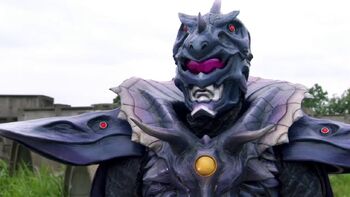
Bad guys now, and we're delving into some deep spoilery territory! Dr. Maki is cut out of the same cloth of exaggerated almost cartoonish parody of a character, being this cold, quiet, unfeeling and calculating man... but he never makes eye contact with anyone and keeps talking to the creepy-as-shit doll of a baby that perches on his arm. And as silly (and unsettling) as this is, any time said doll gets knocked out, Maki immediately devolves into panicking and screeching, clearly showing that he's not quite well in the head. The doll is also the source of the show's most consistently hilarious running gag.
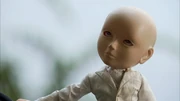 I really kind of wish that Maki was a bit more taken seriously when he graduates from just being the token unethical teammate among Kougami's group and into basically the master manipulator trying to get the Greeed to finally grow into their ultimate form, eventually taking on the purple medals and evolving into a Greeed, and manipulating the other Greeed to transform into the massive CGI monstrosity that is the Medal Vessel.
I really kind of wish that Maki was a bit more taken seriously when he graduates from just being the token unethical teammate among Kougami's group and into basically the master manipulator trying to get the Greeed to finally grow into their ultimate form, eventually taking on the purple medals and evolving into a Greeed, and manipulating the other Greeed to transform into the massive CGI monstrosity that is the Medal Vessel.Oh, and we also learn that Maki has a very heavy sister complex, and that the doll was given to him by her before she went off to get married and subsequently burn to death. Maki's obsessed with death and the sum of a person's life, in direct opposition to Kougami's obsession with birth, and while I wished we could've gotten more development from him, I do like how the flashbacks to his kind sister turns out to be distorted memory of his emotionally abusive sister, and the revelation that Maki is the one who set his sister's house on fire. I think the show's implying that it's only after his sister's death that Maki realizes just how cruel she has been, and not just in the whole "leaving him" bit? I dunno. I could think of a lot of worse villains than Maki, but I really wished we had more development.

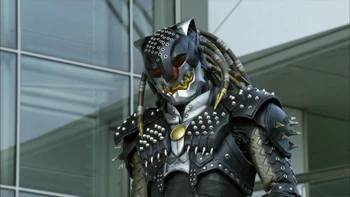
Kazari, the greed representing the yellow feline medals (LaToraTah) is probably the most profilic and dangerous of the four main antagonistic Greeed, and the one that keeps staying around and manipulating everyone, mostly staying in the background while Eiji and Ankh fights against Uva, Mezool and Gamel, and later on is revealed to be working alongside Dr. Maki under the noses of Kougami. He's even more treacherous than any of the other Greeed, and I'm pretty sure that's the whole point of his character. He'll backstab everyone in his path, sometimes to a ridiculous degree, and ended up being killed by some of his former ally-enemies teaming up against him and killing him. A pretty decent villain.


Uva represents the green bug medals, Gata-Kiri-ba, and he's the most prolific out of the Greeed other than Kazari, being the most impulsive and the most insistent Greeed... but also probably the weakest, due to having the most of his core medals stolen by Ankh and Eiji. Honestly, thanks to his status as being the first Greeed to have all of his core medals stolen by Eiji, I genuinely thought he was going to be the first to die, but like a cockroach Uva keeps surviving, even after betrayals from Kazari... but of course, he ends up being manipulated by Maki and used as the ultimate vessel for a Greeed's final evolution, being turned into... into geometry or something.
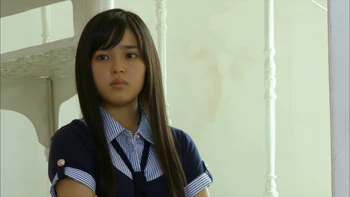
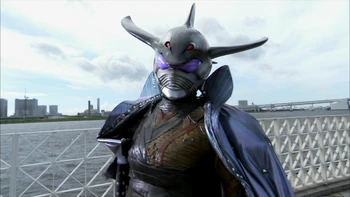
Mezool is the Greeed that represents the aquatic themed Sha-u-ta combo, and she's... she's one of the two flatter Greeed, and while her personality early on is basically "the girl one" and the one that can sweet-talk the other Greeed to listen to her lies, we later on learn that Mezool is obsessed with the desire to emulate motherhood, shown in a particularly fucked-up episode near the end where she kidnaps mothers and children specifically to properly experience "love". It's also very interesting that she ends up tolerating Gamel who is obsessed with pleasing her throughout the series, before admitting at the end that she never felt anything and only pretended to be so just to make her desires feel not hollow.


Gamel, representing the gray "big mammal" Sa-go-zou combo, is... he's the dumb one. Being portrayed as childlike and brutish, his one goal and one desire in life is to please Mezool. He's not weak, but he's the most easily manipulated by Greeed and our heroes alike into doing random shit and becoming a pawn. His final death scene with him going on a full rampage in a futile attempt to resurrect the fallen Mezool, all the while dr. Maki watches with clinical bemusement... it's actually pretty sad.
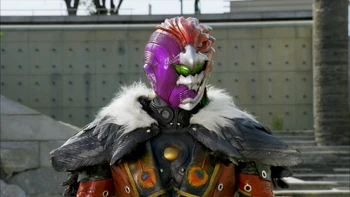
The Lost Ankh is the partially-formed Greeed formed by the other Ankh arm or some shit, and... and his "human" form is a little boy. It's a pretty cool enemy that the show purposefully didn't really give much in terms of characterization, and honestly seems to symbolize -- both to the audience and to Ankh himself -- what a being with nothing but pure desire, if Ankh was a smidgen more robotic and unfeeling, would end up becoming. A flat villain, but one that fits the story well.
Gimmicks, Costumes & Power-Ups
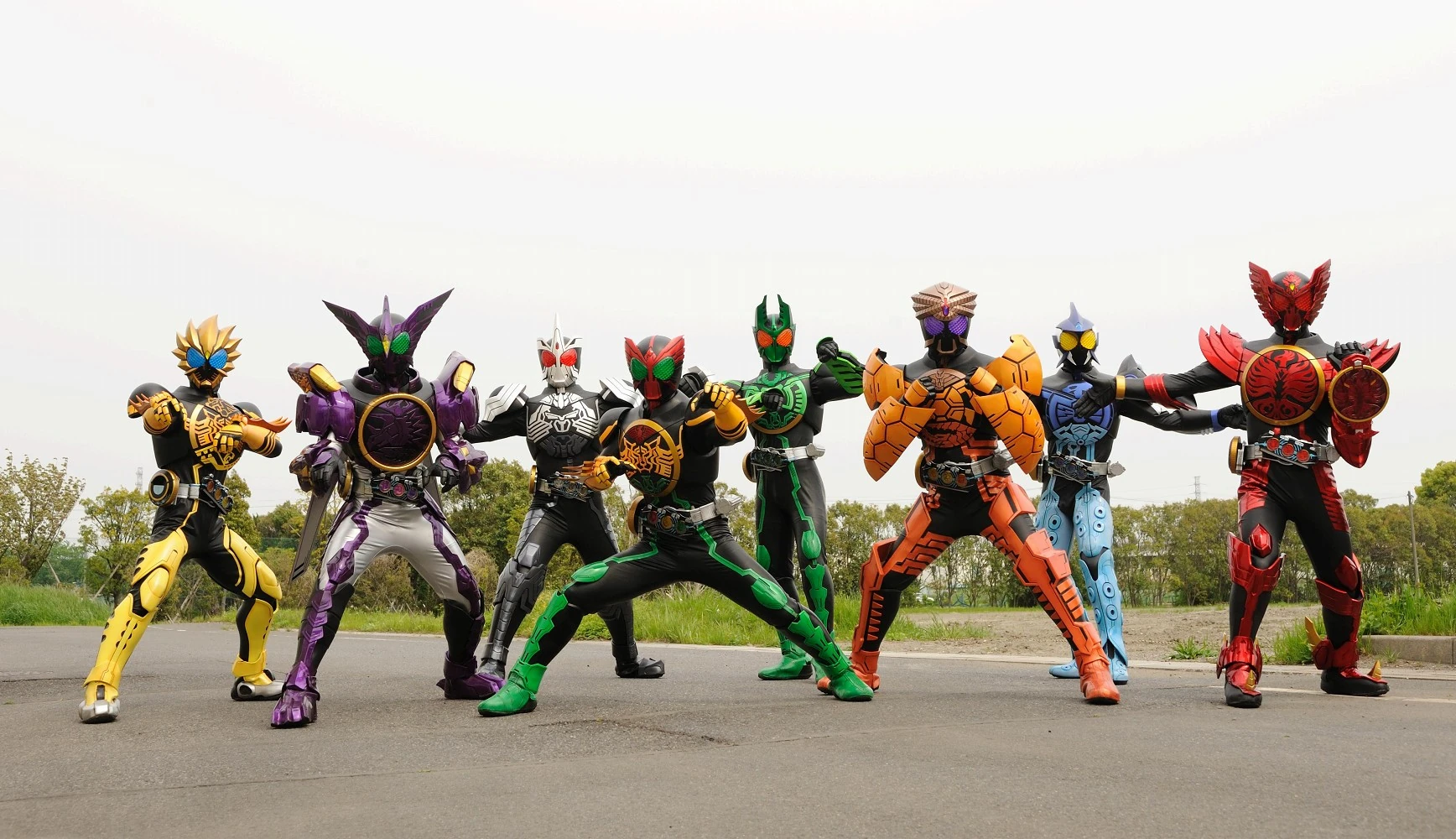
So it's hard to talk about OOO without talking about the gimmicks of the show, and it's... it's sort of complex. Basically, the Greeed monsters are essentially living embodiment of desire and coins (sorry, medals), and there are different sorts of medals -- the Core Medals, which are the main things that Greeed are hunting for and allow Eiji to access different forms, and three parts of each "set" of medals -- head, body and leg -- exist. And any given OOO form is a bizare combination of any three medals, with "full sets" giving him far, far more power at the cost of being damaging to Eiji's body.
It's perhaps one of the coolest way of having a fuck-load of forms without losing track of the sheer amount of collectible things (looking at you, Build), and while around the second part of the show it basically ends up just waiting for Eiji to bust out a full combo, this relatively simple system helps to really make the show have a lot of different forms while also feeling pretty consistent.
I'm not sure what my favourite suits are, if we're being honest. Shauta is always neat, and Tajador is majestic, but Gatakiriba and Sagozou are probably my favourite? Also, OOO's belt with its sing-song Taka tora batta, Ta-To-Ba TAH TOH BA Tatoba is easily my favourite hammy belt sound ever.


I don't normally talk about a Kamen Rider's bikes, because they tend to just be "holy shit the bike is cool", but OOO's bike is uniquely hilarious because it's a transformer. It doesn't transform into a robot, though (this ain't the Autovajin), but into a VENDING MACHINE. Why? Because of the association between the coin-medals that the show uses as a main gimmick with vending machines. The Kougami Foundation installed multiples of these vending machines all over the city, and it's always hilarious that Eiji has to plop in a coin and pay for the privilege of essentially renting a bike.



So because the bike's a vending machine to tie in with the whole "coins" gimmick, the little animal sidekicks are these Candroids, transforming soda cans that turn into robot animals. They make adorable sounds, but are ultimately just a walking merchandise advertisement. I am baffled why they share so much similarities with the animals that the Greeed are based on, because these are just an army of recon robots created by the Kougami Foundation.
It's hilarious mostly because every time our heroes want to use it they have to stop at a vending machine and pay for the privilege to use these.

Birth, meanwhile, uses a lot of cell medals as ammunition in his little machinegun, as well as to activate his "CLAWS", which are like these robotic weapons like tank tread legs and crane arms to bulk himself up. Because I am immature, I keep chuckling any time Birth uses "BREAST CANNON". It's hilarious.
Movies & Specials:
- Kamen Rider x Kamen Rider OOO & W ft. Skull: Movie War Core -- one of the first examples of the franchise's biggest stumbles, this is probably one of the worst crossover movies due to just how bizarrely messy everything is, how disconnected both the OOO and W parts are, how the final villains show up out of nowhere and how contrived everything is. The Skull portion is neat, but everything else feels pretty slapdash.
- OOO, Den-O, All Riders: Let's Go Kamen Riders -- It's got some fun moments, I guess, but the anniversary plot's essentially a pretty bland "Flashpoint" style alternate reality storyline that's not realized quite particularly well. The pacing is shaky as we move around from one point to the next, and other than facilitating the time-travel plot, the Den-O's cast felt utterly superfluous in this one -- and this is from someone who loves Den-O! I definitely walked out of this movie going "well, that was unnecessary". Ankh was hilariously in full tip-top villain form in this one, though, and I thought that was great.
- Kamen Rider OOO Wonderful: The Shogun and the 21 Core Medals -- It's OOO's solo movie outing, and these solo movies tend to be neat-but-throwaway. This one is... all right? It's got a generic cheesy mother/son morale, some shoehorned time travel (it's commonplace in these movies) to accommodate the movie-exclusive form, Fourze randomly shows up as the next-rider preview... There's also the fanservicey final fight where OOO transforms to all of his forms. It's all right compared to all of the other slapdash OOO movies, but not the best rider movie overall.
- Kamen Rider OOO: Quiz Dance and Takagarooba -- A televi-kun special DVD. Very throwaway, and involves DVD select-your-answer quizzes heavily.
- I think we covered Mega Max when I reviewed Fourze? It's all right.
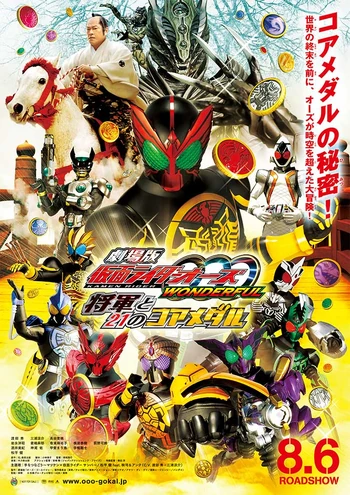
No comments:
Post a Comment